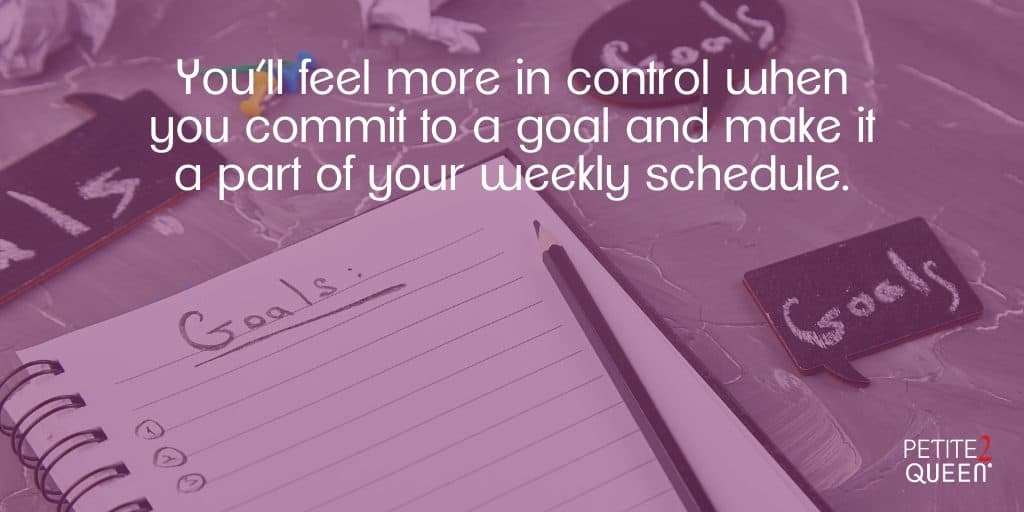We’ve all been there: feeling completely out of control and wondering how to get back on track. It’s normal to feel a lack of agency over your life, especially when so much truly is out of your hands. You can’t force a hiring manager to pick you, and you can’t foresee a flat tire wrecking your carefully-planned schedule and budget. A lot of life is about how we deal with what it throws us, be it opportunities, challenges, or lemons.
Because in spite of all the things that are up to fate, you do have some control. It’s just a matter of learning where to find it. Not sure where to look first? Here are some ways you can start to take back your life and gain more control.
#Goals
Part of the agency – or lack thereof – that we feel comes from what we expected to do with our lives versus what we’re actually accomplishing. Whatever you thought you’d be doing by now, life doesn’t always work out so simply. Things don’t go according to plan, especially when unexpected events change your course. Given where you’re at now, think about what you want to do or know. Is there something you always dreamed of doing? Something new that has recently captured your interest? Write some ideas down, then whittle it down and decide what matters to you the most. Turn these dreams into goals.
Making goals will give you something to aim for and focus on. You can choose big ones or small ones, but keep in mind what you can accomplish in the short-term. If you do have big goals – Own a home! Be a doctor! – try to break them down into smaller ones that are easier to check off. For example, if you feel a lack of control over your general health, a major goal might be to adopt a healthier lifestyle. Smaller goals may include going to the gym at least once a week or cutting your soda intake in half. Be ready to take baby steps towards those bigger goals.

Make Plans
Goals are an important first step. Now it’s time to put them into action. Turn some of your small goals into an entry in your to-do list. What are days and times that you can spend on achieving this goal? Take control of your schedule by making it work for you. Let’s look at that gym example: What day of the week would be convenient for you to fit in a workout? What time will fit into your schedule? Make concrete plans about when, where, and how you’ll work towards your goals, then set up reminders or write them down in your planner. You’ll feel more in control when you commit to a goal and make it a part of your weekly schedule.
Reality Check: Changing Plans
A few months ago, I looked at my list of goals and planned out a hefty schedule that would allow me to squeeze everything in. After finishing work at 5pm, each day included a promise to read a few chapters, practice piano, work on my music blog, work on the novel I’m theoretically writing, and spending quality time with my husband and my cat. I also figured I could work out a few days a week, too. My sister sagely warned that I was putting too much on my plate, but I blundered ahead anyway.
I finally recognized that it was, in fact, too much. I was burnt out, and worse, falling behind on some of the things I cared about most. As more and more self-imposed projects piled up, I fell behind on dozens of music news stories and largely stopped practicing piano. I felt overwhelmed and like I had no control of my time.
As I recently realized, it’s vital to be realistic about how much you can get done in a day. If you piled too much in your to-do list and it’s difficult to keep up, reassess your plans. Step back and determine what the problem is, then change accordingly. Adjust your goals and plans to fit your reality.

In my case, I’ve learned that I don’t have to do everything every day. I can go to the gym or work on my novel. I can – and should – take weekends off to recharge and spend quality time with others.
Be honest with yourself and always ready to pivot. It’s okay if you can’t achieve your goals as quickly as you’d like, as long as you keep working towards them at a pace that works for you.
The Power of “No”
On a related note, make a point of recognizing when you simply don’t have enough time. It’s okay to say “no” to someone – even if that someone is yourself. You don’t have to attend the event your friend invited you to or babysit your neighbors’ kids. You aren’t required to do things just because others ask you. Sometimes, you need to take control back by deciding what you do and don’t do. Whether you don’t have time for something or it’s just not something you’re interested in spending time on, you’re allowed to say “no.”
You should also say “no” to getting things done within an impossible timeframe. Not long ago, I agreed to proofread my sister’s college essay by the end of the day. However, I knew I wouldn’t have time for it until the following evening, so I told her ahead of time that I would actually need another day on it. Be upfront about your time and availability. It’s important to manage others’ expectations of you and make sure they’re realistic. If you’re honest with them, you’ll feel less stressed.

Organize Your Way Through This
You can gain control through your organizational skills, too. Throughout our childhood, my sister and I were always opposite in one key way: I was super neat and organized, whereas she was a bit of a slob. Her room perpetually looked like a tornado had hit it, and she often had a hard time finding important items. She didn’t have control over her environment, and that sometimes led to missing homework assignments and hurt grades.
It’s okay to be a little messy sometimes, but certain things are best kept in an easy-to-remember location. Go through all your most important items – whether it’s critical paperwork or keys to your rarely-visited storage unit – and organize them into places where you’ll always be able to find them. Knowing where to look for things can save a lot of trouble. A couple years ago, I kept receiving medical bills for the same visit. I’d already paid the bill and was able to find a copy of it and my receipt to prove it. Having that information handy made it easy to resolve the situation. You never know when you’ll need something!
In addition to organizing your valuables, it’s also a great idea to do a regular purge, too. Every year or so, go through all your things and think carefully about how often you actually use it. Anything you haven’t worn/used/looked at in years should be donated or thrown away. Purging unnecessary items will get rid of the stressful clutter, and you’ll be able to either enjoy the extra space or fill it with things that enrich the area. Gain more control of the environment so that it helps you!
Regaining Control
We only have so much control in our lives. While we can’t decide what others do, we can choose how we respond to situations; we can control our attitudes and our actions. However, we can gain even more control by making goals and plans, knowing when and how to pivot, and managing our own and others’ expectations. Controlling your environment is key to keeping everything in balance, as is learning to say “no” when something doesn’t fit into your schedule or values. These tips will help you gain more control of your life, so try them out and reap the rewards.
Petite2Queen provides virtual mentoring to young women in life, at work, and in sales. Follow us for more practical advice you can put to use to improve your life and career.

Amanda Whitbeck is Vice President of Operations at Petite2Queen. Since earning her master’s degree in Global Entertainment & Music Business from Berklee College of Music, Amanda has played key roles facilitating growth at start-ups. She’s also worked in diverse sectors of the music industry, from live events promotion to entertainment journalism. She brings her expertise in music business, writing, and website development to Petite2Queen.

